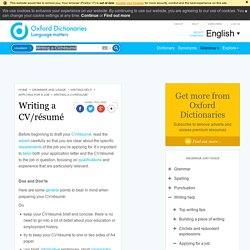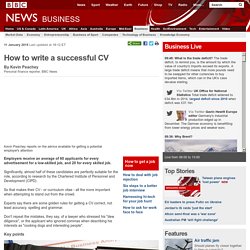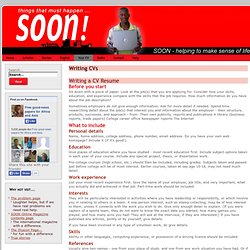

CV template: Free CV templates and Curriculum Vitae Templates. We know writing a CV can be a confusing task.

But our free templates are designed to take the pain out of writing your job application. Our free templates will help you write a professional CV whatever your circumstances. So whether you’re unemployed, a recent graduate, looking for your first job or looking to climb the career ladder, we’ve got templates specifically designed for you.
Unemployed Although you haven’t found the right job yet, don’t get disheartened, work on your CV instead. You’re currently unemployed You’ve recently become unemployed You’ve been made redundant Unemployed (with CV gaps) Most employers understand that sometimes we can’t help but have CV gaps – as long as you’re up front and honest about it and showcase what you’ve been doing in your spare time you won’t automatically be rejected. CV Builder - CV Building Template. Writing a CV/résumé. Before beginning to draft your CV/résumé, read the advert carefully so that you are clear about the specific requirements of the job you’re applying for.

It’s important to tailor both your application letter and the CV/résumé to the job in question, focusing on qualifications and experience that are particularly relevant. Dos and Don’ts Here are some general points to bear in mind when preparing your CV/résumé: Do Don’t go into too much detail: employers are too busy to read rambling or unfocused CVs/résumés.leave gaps in your employment history: add a sentence or two explaining any periods that are not accounted for.use too many different fonts or typefaces: keep to one or two that are clear and easy to read.use inappropriate colours, graphics, or photos.name people as referees unless you’ve confirmed that they’re happy to provide a reference for you.
Structuring your CV/résumé Personal details Always begin with your personal details, i.e Employment history Educational qualifications Referees. How to write a successful CV before applying for a job. 11 January 2015Last updated at 19:12 ET By Kevin Peachey Personal finance reporter, BBC News Kevin Peachey reports on the advice available for getting a potential employer's attention Employers receive an average of 60 applicants for every advertisement for a low-skilled job, and 20 for every skilled job.

Significantly, almost half of these candidates are perfectly suitable for the role, according to research by the Chartered Institute of Personnel and Development (CIPD) So that makes their CV - or curriculum vitae - all the more important when attempting to stand out from the crowd. Experts say there are some golden rules for getting a CV correct, not least accuracy, spelling and grammar. Don't repeat the mistakes, they say, of a lawyer who stressed his "dew diligence", or the applicant who ignored commas when describing his interests as "cooking dogs and interesting people". Key points Applicants will often need to complete an application and send a CV Desperate measures Changing CVs. CVs (The University of Manchester) A good CV is clear, has a logical structure and is tailored specifically for a particular role or purpose. In the UK a CV is usually 2 pages long although there are some exceptions. A CV is usually sent with a covering letter which explains why you have applied for the job and your suitability.
A general CV is not good enough A recruiter will be able to see immediately whether your CV addresses the skills and attributes required for the job. Use the information about the job to help you tailor your CV. Use the job / person specification or advert for that opportunity.Check the company website, what attributes do they look for? Successful CV resumes: guide on how to write a good CV resume, apply & obtain a job interview. Before you start Sit down with a piece of paper.

Look at the job(s) that you are applying for. Consider how your skills, education, and experience compare with the skills that the job requires. How much information do you have about the job description? Sometimes employers do not give enough information. What to include Personal details Name, home address, college address, phone number, email address. Education Give places of education where you have studied - most recent education first. Pre-college courses (high school, etc.) should then be included, including grades.
Work experience List your most recent experience first. Interests They will be particularly interested in activities where you have leadership or responsibility, or which involve you in relating to others in a team. If you have been involved in any type of volunteer work, do give details. Skills Ability in other languages, computing experience, or possession of a driving licence should be included. References. Resumes, CV writing, CV samples, and Cover letters - CVtips.com.